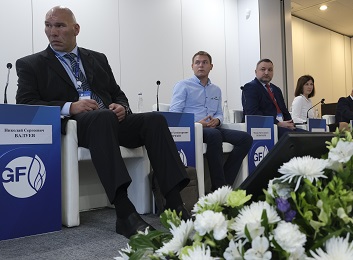
On its last day, the participants of the Gas Forum discussed the problem of recycling and cleaning old pipelines at the conference “Waste Management in the Oil and Gas Sector”. The discussion was attended by representatives of government and business. The session was moderated by Elena Mazlova, Head of the Interdepartmental Sector of Environmental Problems, Professor of the Department of Industrial Ecology of Gubkin Russian State University of Oil and Gas, academician of the Russian Academy of Natural Sciences.
In the welcome speech, Nikolai Valuev, first deputy chairman of the State Duma’s Ecology Committee, focused on the priority and urgency of the problem: “Our task is to think about how to reduce the environmental damage caused by industrial waste from oil and gas industry enterprises today. In our country, only 140 thousand km of decommissioned pipes are left to lie the soil. The total length of decomissioned pipes filled with petroleum products, often radioactive, is 3.5 times longer than the length of the equator. We can only make a guess how dangerous it is. The problem needs to be resolved, and the Committee for Environmental Protection is fully and completely open to proposals.”
The discussion was continued by Natalia Belyaeva, Deputy Chairman of the Ecology Committee of Delovaya Rossiya, Head of Delphi Law Firm: “As part of the reform of the waste management industry launched in 2014, the approach has changed. Now, introducing the basic principles of public policy, we should first of all think about how to reduce the amount of waste as much as possible.” In this regard, according to Belyaeva, there is a problem of “getting oil and gas companies out of the comfort zone”: the order in which the used pipelines were disposed of as scrap metal was correct until, as a result of numerous inspections, it was determined that such scrap contains a lot of wastes of various kind and cannot be disposed of as is.
“The topic of pipe turnover is a complex one,” – agreed Vladimir Berezin, Councillor to the Industry Interaction Division of the Department of State Policy and Regulation in the Field of Production and Consumption Waste Management, Ministry of Natural Resources of the Russian Federation. “The position of Rosprirodnadzor on this issue has not changed: if the pipes have lost their original properties, they are waste, and there can be no other way.”
“Nevertheless, law enforcement practice shows that many oil and gas transportation companies do not consider waste pipes to be production waste,” – said Mikhail Ponomarev, a representative of the Institute of Legislation and Comparative Law under the Government of the Russian Federation sharing his experience. – "This entails financial and legal risks. For example, in the absence of a waste passport, not only fines, but also administrative suspension of activities for up to 90 days can be imposed, and the absence of a license for the handling of waste of hazard classes 1 – 4 can lead to administrative, and criminal liability.”
Marat Galiev, CEO of TransLomPererabotka, looked at the acute problem of counterfeit products on the market: “St. Petersburg faced this problem with housing and communal accidents having claimed 43 lives over the past 5 years. Most of the accidents were due to the deterioration of pipes that were originally mounted as if they were new.” An analysis of the activities of pipe cleaning enterprises said that 90% of companies use open-air landfills and outdated technologies, not caring about harmful emissions into the atmosphere when firing metal parts of pipelines, polluting water bodies by dumping wastewater.
The speaker suggested looking for ways to solve this problem by using new technologies: the use of advanced equipment for pipe cutting, eliminating the spill of oil products; remelting 100% of the metal structures of pipelines to prevent counterfeit products from falling back into the industry. “The economic effect of loading the metallurgical complex’s production with orders for new pipes will be much higher than the savings from using old equipment,” – said Marat Galiev. – "If we take into account the experience of our foreign colleagues, then in Japan not only 100% recycling is used, but also preliminary sorting of scrap metal, which allows simplifying processing at lower costs. Unfortunately, this is not the case in this country yet.”
The topic of falsification and counterfeiting in the field of pipeline processing was continued by Igor Malyshev, Director of the Pipe Industry Development Fund (FRTP): “The market for pipe cleaning, according to our estimates, is 50 billion rubles a year, this is an extremely profitable business. By 2025, the volume of worked-out pipeline sections that will need to be dismantled will increase to 2 million tons per year. Where will these pipes go? Into re-melting or into our houses? We need to solve this issue in the near future. Rosprirodnadzor has already begun to operate, and about 30 of the largest “pipe restorers” have closed, five criminal cases have been initiated.”
The speakers mentioned the practical importance and relevance of the reports delivered and expressed their readiness to continue the dialogue in order to search for integrated solutions and improve the current situation.